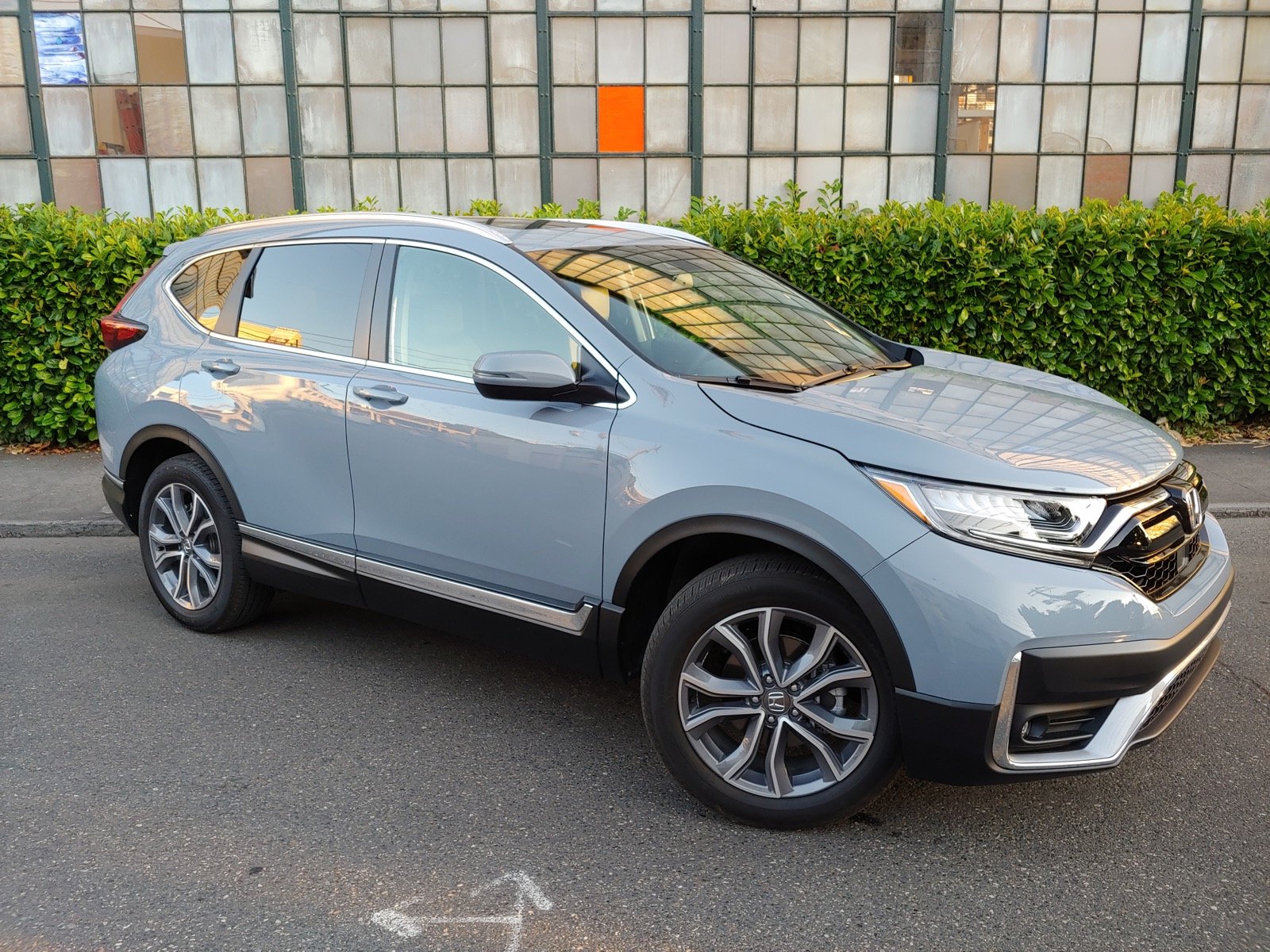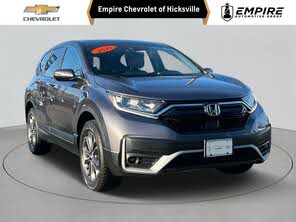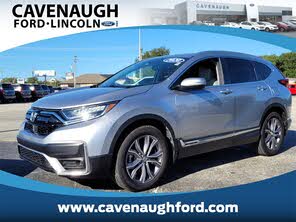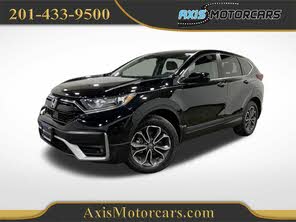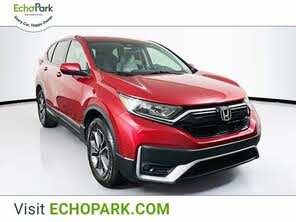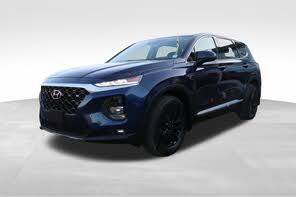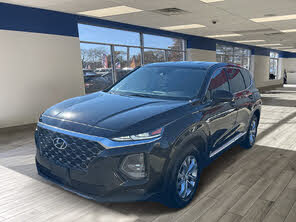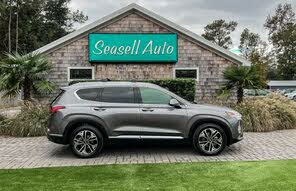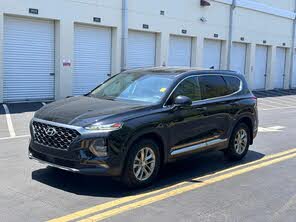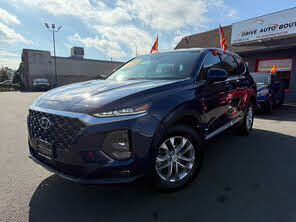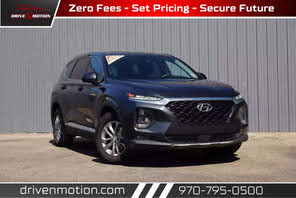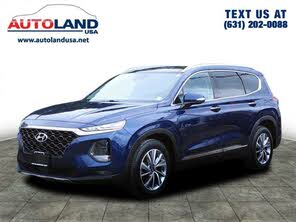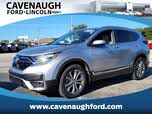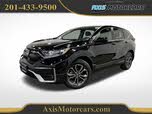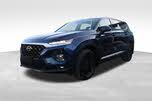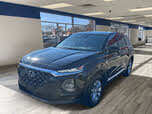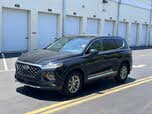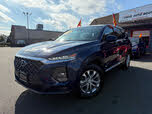2020 Honda CR-V vs 2020 Hyundai Santa Fe
Overview | |
MSRP$26,275 | MSRP$25,150 |
Average price$20,068 | Average price$24,119 |
Listings1181 | Listings1317 |
Ratings & Reviews | |
User Reviews | User Reviews |
Expert reviews8.8 out of 10 | Expert reviews7.5 out of 10 |
Pros
| Pros
|
2020 Hyundai Santa Fe Reviews SummaryLast year, Hyundai changed its approach to the Santa Fe. The smaller five-passenger Santa Fe Sport got drop-kicked from the automaker’s lineup, replaced by this completely redesigned version of the SUV. The larger seven-passenger Santa Fe got a new name for one year (Santa Fe XL), and then the all-new 2020 Hyundai Palisade replaced that vehicle. With the Palisade’s arrival, there is just one Santa Fe for 2020, a five-passenger crossover that resides in a sweet spot between traditional compact and midsize models. It gets several updates, too, including a standard rear-seat reminder system, an available camera-based Blind-Spot View Monitor system, and new design accents to better distinguish the top trim level. | |
2020 Honda CR-V Reviews SummaryHonda’s compact SUV has been satisfying buyers for more than two decades, with more than five million CR-V’s sold. Such a legacy means the CR-V has long had its wrinkles smoothed out into a comfortable and capable crossover package that’s only downside may be its sheer inoffensiveness. This year’s model gets engine and safety upgrades, which improve fuel economy and help to make Honda’s bestseller an even better value. | |
No video found | |
Popular Features & Specs | |
Engine2.4L 185 hp I4 | Engine1.5L 190 hp I4 |
Drive TrainFWD | Drive TrainFWD |
Seating Capacity5 | Seating Capacity5 |
Horsepower185 hp @ 6000 rpm | Horsepower190 hp @ 5600 rpm |
MPG City22 | MPG City28 |
MPG Highway29 | MPG Highway34 |
Engine | |
Engine Name2.4L 185 hp I4 | Engine Name1.5L 190 hp I4 |
Torque178 lb-ft @ 4000 rpm | Torque179 lb-ft @ 2000 rpm |
Horsepower185 hp @ 6000 rpm | Horsepower190 hp @ 5600 rpm |
DrivetrainFWD | DrivetrainFWD |
Fuel Economy | |
MPG City22 | MPG City28 |
MPG Highway29 | MPG Highway34 |
Interior | |
Seating Capacity5 | Seating Capacity5 |
Safety | |
Front Crash Overall4 | Front Crash Overall5 |
Side Crash Overall5 | Side Crash Overall5 |
Dimensions & Capacity | |
Cargo Space35.9 cu ft | Cargo Space39.2 cu ft |
Curb Weight3591 lbs | Curb Weight3337 lbs |
Height66.1 in | Height66.1 in |
Length187.8 in | Length182.1 in |
Width74.4 in | Width73.0 in |
Wheelbase108.9 in | Wheelbase104.8 in |
Maximum Payload1138 lbs | Maximum Payload1358 lbs |
Number of doors4 | Number of doors4 |
Maximum Towing Capacity2000 lbs | Maximum Towing Capacity1500 lbs |
Overview | ||
MSRP | $26,275 | $25,150 |
Average price | $20,068 | $24,119 |
Listings | ||
Ratings & Reviews | ||
User reviews | ||
Expert reviews | 8.8 out of 10Read full review | 7.5 out of 10Read full review |
Pros & cons | Pros
| Pros
|
Summary | Last year, Hyundai changed its approach to the Santa Fe. The smaller five-passenger Santa Fe Sport got drop-kicked from the automaker’s lineup, replaced by this completely redesigned version of the SUV. The larger seven-passenger Santa Fe got a new name for one year (Santa Fe XL), and then the all-new 2020 Hyundai Palisade replaced that vehicle. With the Palisade’s arrival, there is just one Santa Fe for 2020, a five-passenger crossover that resides in a sweet spot between traditional compact and midsize models. It gets several updates, too, including a standard rear-seat reminder system, an available camera-based Blind-Spot View Monitor system, and new design accents to better distinguish the top trim level. | Honda’s compact SUV has been satisfying buyers for more than two decades, with more than five million CR-V’s sold. Such a legacy means the CR-V has long had its wrinkles smoothed out into a comfortable and capable crossover package that’s only downside may be its sheer inoffensiveness. This year’s model gets engine and safety upgrades, which improve fuel economy and help to make Honda’s bestseller an even better value. |
Video | No video found | |
Popular Features & Specs | ||
Engine | 2.4L 185 hp I4 | 1.5L 190 hp I4 |
Drive Train | FWD | FWD |
Seating Capacity | 5 | 5 |
Horsepower | 185 hp @ 6000 rpm | 190 hp @ 5600 rpm |
MPG City | 22 | 28 |
MPG Highway | 29 | 34 |
Engine | ||
Engine Name | 2.4L 185 hp I4 | 1.5L 190 hp I4 |
Torque | 178 lb-ft @ 4000 rpm | 179 lb-ft @ 2000 rpm |
Horsepower | 185 hp @ 6000 rpm | 190 hp @ 5600 rpm |
Drivetrain | FWD | FWD |
Fuel Economy | ||
MPG City | 22 | 28 |
MPG Highway | 29 | 34 |
Interior | ||
Seating Capacity | 5 | 5 |
Safety | ||
Front Crash Overall | 4 | 5 |
Side Crash Overall | 5 | 5 |
Dimensions & Capacity | ||
Cargo Space | 35.9 cu ft | 39.2 cu ft |
Curb Weight | 3591 lbs | 3337 lbs |
Height | 66.1 in | 66.1 in |
Length | 187.8 in | 182.1 in |
Width | 74.4 in | 73.0 in |
Wheelbase | 108.9 in | 104.8 in |
Maximum Payload | 1138 lbs | 1358 lbs |
Number of doors | 4 | 4 |
Maximum Towing Capacity | 2000 lbs | 1500 lbs |
Inside, the Santa Fe boasted a dramatic dual-cowl dashboard design that seamlessly extended into door panels adorned with diamond-textured speaker grilles. The interior featured a high-contrast color scheme in versions with gray or beige tones. Even the flecked headliner pattern added a touch of sophistication. While the materials, such as glossy plastic and stiff leather upholstery, fell short of matching the design's high style, the build quality and efficient controls were commendable.
The 2020 Honda CR-V, in contrast, had been on the market since 2017, and its design had become familiar yet appealing. Honda’s design philosophy for the CR-V incorporated curvy, car-like lines inspired by its sedan lineup, giving it a station wagon feel rather than an SUV presence. This made it an ideal family vehicle on the exterior.
Inside, however, the CR-V suffered from a disjointed mix of materials and textures. Upscale trims featured wood-look trim and leather upholstery, contrasting sharply with the low-quality plastics. This mix often reminded drivers that even the more expensive models were upgraded versions of a basic car rather than a premium product.
The 2020 Hyundai Santa Fe had a standard 2.4-liter four-cylinder engine producing 185 horsepower, which wasn’t ideal for its weight range of 3,591 to 3,946 pounds. Instead, the preferred choice was the turbocharged 2.0-liter four-cylinder engine producing 235 horsepower and 260 lb-ft of torque between 1,450 and 3,500 rpm. This engine offered significantly better performance, particularly at altitude. An eight-speed automatic transmission directed power to either front wheels or all four with the available AWD. The FWD model experienced torque steer under hard acceleration, a problem eliminated with AWD. The 2.0T had a towing capacity of 3,500 pounds and an EPA-rated fuel economy of 23 mpg combined, though real-world testing showed 22.1 mpg.
The Santa Fe’s ride and handling were smooth and predictable, making it a competent daily driver. While it managed moderate off-roading well, including mud puddles, it did not inspire adventurous driving. The Limited trim’s laminated glass ensured a quiet, comfortable highway ride.
The 2020 Honda CR-V simplified its engine lineup by exclusively using the 1.5-liter turbocharged four-cylinder, offering 190 hp and 179 lb-ft of torque. Paired with a continuously variable automatic transmission (CVT), this engine delivered responsive performance, especially in Sport mode. The CVT mimicked a conventional automatic transmission well, masking its typical sluggishness and engine droning.
Weighing just 3,337 pounds for the FWD LX model, the CR-V’s light weight contributed to its excellent road manners, nimble handling, and minimal body roll. Its car-like demeanor was particularly evident in its comfortable, buttoned-down ride quality. The CR-V’s fuel efficiency was another strong suit, achieving an EPA rating of 30 mpg combined for FWD models and 29 mpg for AWD models, leading its class in fuel economy.
Thoughtful attention to detail was a hallmark of the two-row Hyundai Santa Fe. It featured creative storage solutions and stain-resistant fabrics, making it ideal for families. Our test vehicle came with eight-way power-adjustable, heated, and ventilated front seats, and a heated steering wheel. The dual-zone automatic climate control system with a Clean Air ionizer performed well even with the panoramic sunroof. The rear seats offered ample legroom, thigh support, air conditioning vents, and sunshades for added comfort.
However, the Santa Fe’s cargo space was a weak point. With 35.9 cubic feet behind the rear seats and a maximum of 71.3 cubic feet, it lagged slightly behind its midsize SUV competitors but surpassed most compact SUVs. The smart liftgate that opened automatically when sensing the key fob’s proximity added convenience.
The Honda CR-V excelled in packaging, offering a roomy cabin comparable to the Volkswagen Tiguan without the bulk. The excellent seating position provided good head- and legroom, and the low cowl enhanced visibility. Cargo space was equally impressive, matching the Tiguan with a two-position load floor that offered 75.8 cubic feet with the rear seats folded.
Clever storage solutions were abundant, such as the deep center console between the front seats and expanded door pockets. The two-position load floor allowed for either maximum cargo space or a flat load floor, enhancing the CR-V’s versatility.
The 2020 Hyundai Santa Fe’s infotainment system was exemplary. Positioned high on the dashboard, the touchscreen system included stereo control knobs, main menu shortcut buttons, Bluetooth connectivity, and Apple CarPlay and Android Auto. SEL trim added SiriusXM satellite radio, Blue Link connected services with three free years, and a host of remote features. Limited trim enhanced the package with an 8-inch display, navigation, surround-view camera, wireless charging, and a 12-speaker Infinity sound system. Additional tech included a head-up display and sophisticated voice recognition.
In contrast, the 2020 Honda CR-V suffered from outdated infotainment. The 5-inch screen on LX trim was significantly lacking, offering only Bluetooth connectivity and Pandora compatibility. The 7-inch screen on higher trims was still small compared to rivals and lacked physical buttons, making operation cumbersome. Apple CarPlay and Android Auto, only available on trims with the larger screen, felt tacked on rather than integrated. However, Honda made strides with additional USB ports and wireless charging on the Touring trim.
The 2020 Hyundai Santa Fe was a top choice for safety, earning a five-star overall rating from NHTSA and a Top Safety Pick from IIHS. Standard safety features across all trims included adaptive cruise control, forward collision warning, automatic emergency braking, lane-departure warning, and lane-keeping assistance. The driver monitoring system and rear-seat reminder enhanced safety. Higher trims added blind-spot warning, rear cross-traffic warning, and a unique safe exit assist system. The Limited trim’s Blind-Spot View Monitor provided live video feeds of blind spots, adding an extra layer of safety.
The 2020 Honda CR-V came standard with the Honda Sensing suite, offering forward-collision warning, automatic emergency braking, road-departure mitigation, adaptive cruise control, and lane-keeping assist. Automatic high beams were also standard. EX trims and above included blind-spot and cross-traffic monitoring. NHTSA awarded the CR-V five stars overall, but IIHS caveated itsTop Safety Pick designation due to the lower-performing halogen headlights on non-Touring trims. Only the Touring model had LED headlights, which significantly improved nighttime visibility.
CarGurus highlights
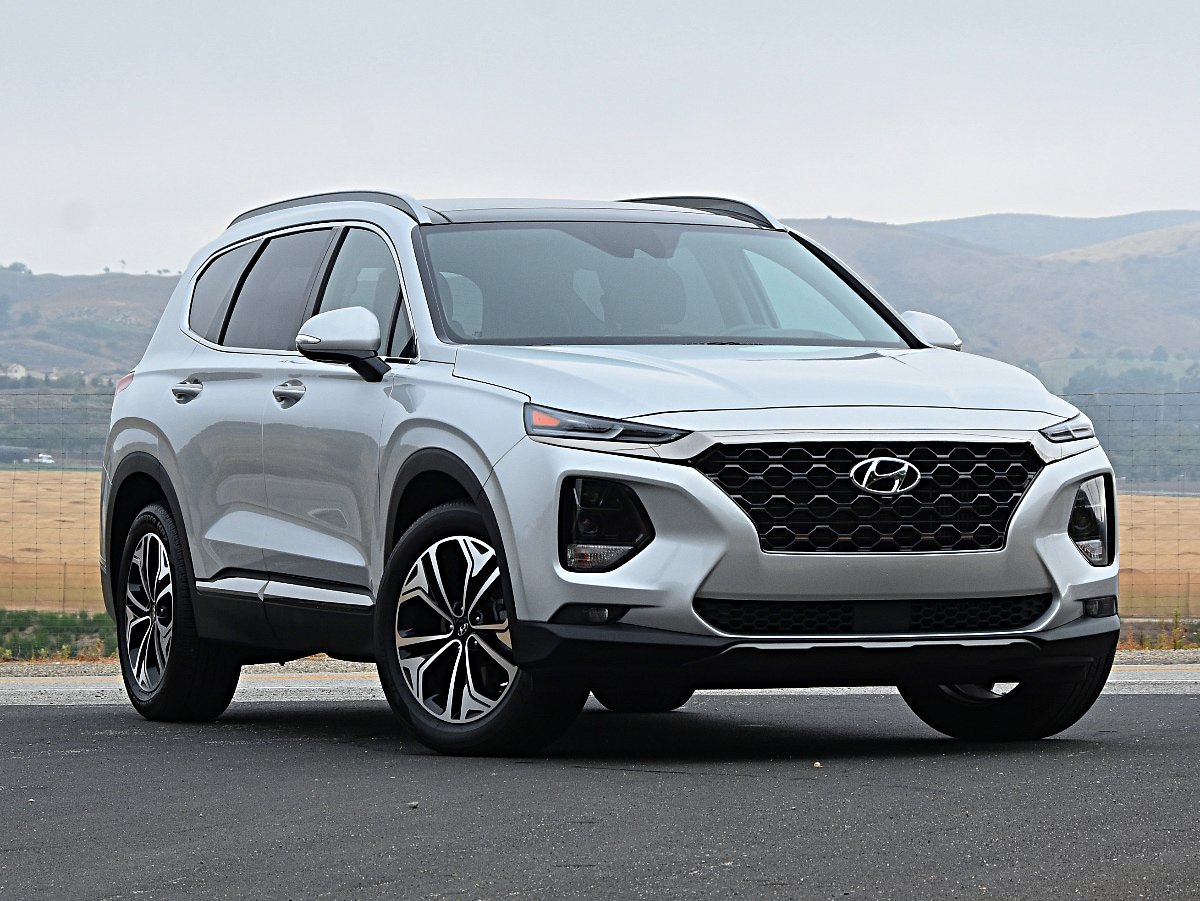
According to CarGurus experts, the overall rating for the 2020 Hyundai Santa Fe is 8.8 out of 10, while the 2020 Honda CR-V scores 7.5 out of 10. Based on these ratings, the 2020 Hyundai Santa Fe emerges as the preferred choice. Its unique design, advanced technology, and comprehensive safety features offer a well-rounded package for families and individuals alike. The Santa Fe’s daring style, robust tech suite, and top-tier safety credentials make it an excellent choice for those seeking a versatile midsize SUV.
Choose the 2020 Honda CR-V if:
- You prioritize practical, efficient packaging with excellent headroom, legroom, and cargo space.
- Fuel economy is a key consideration, with the CR-V leading its class.
- A car-like driving demeanor and nimble handling are important for your daily routines.
Choose the 2020 Hyundai Santa Fe if:
- You value unique and dramatic design choices both inside and out.
- You want a robust suite of technology features, including advanced infotainment options and connected services.
CarGurus highlights

According to CarGurus experts, the overall rating for the 2020 Hyundai Santa Fe is 8.8 out of 10, while the 2020 Honda CR-V scores 7.5 out of 10. Based on these ratings, the 2020 Hyundai Santa Fe emerges as the preferred choice. Its unique design, advanced technology, and comprehensive safety features offer a well-rounded package for families and individuals alike. The Santa Fe’s daring style, robust tech suite, and top-tier safety credentials make it an excellent choice for those seeking a versatile midsize SUV.
Choose the 2020 Honda CR-V if:
Shop Now- You prioritize practical, efficient packaging with excellent headroom, legroom, and cargo space.
- Fuel economy is a key consideration, with the CR-V leading its class.
- A car-like driving demeanor and nimble handling are important for your daily routines.
Choose the 2020 Hyundai Santa Fe if:
Shop Now- You value unique and dramatic design choices both inside and out.
- You want a robust suite of technology features, including advanced infotainment options and connected services.

By: CarGurus + AI
At CarGurus, our team of experienced automotive writers remain at the heart of our content operation, conducting hands-on car tests and writing insightful guides that are backed by years of industry experience. To complement this, we are harnessing AI to make our content offering more diverse and more helpful to shoppers than ever. To achieve this, our AI systems are based exclusively on CarGurus content, ratings and data, so that what we produce is both unique to CarGurus, and uniquely helpful to car shoppers.
